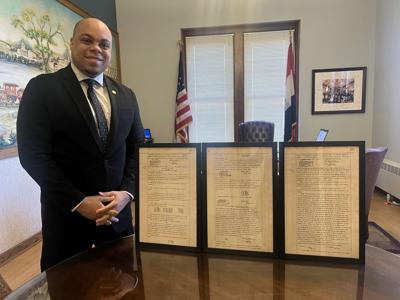On Friday August 3, 1928, in Jefferson City, Missouri Secretary of State Charles U. Becker “set my and affix the Great Seal of the State of Missouri” to a set of documents that would be historic.
At 12:56 p.m. Wednesday August 8, 1928, the documents were filed and recorded by St. Louis Recorder William L. Tanne. The St. Louis American Publishing Company was officially recognized by the state and city of St. Louis.
Nathan B. Young Jr., an attorney and new St. Louisan, helped officially incorporate the business, which had started publication of the St. Louis American earlier that year on March 17, 1928. He would become the newspaper’s first editor.
Upon the official document were written the initials (and one first name) and last names of the business’ first board of directors. Listed in order, with the number of shares, were:
R.W. Kent (275 Shares)
C.U. Turpin (100 shares)
D.R. Clarke (10 shares)
H.G. Phillips (100 shares)
Arthur Dowd (15 shares).
Richard Kent, was owner of the St. Louis Stars, a world champion Negro baseball team.
Charles Udell Turpin, Missouri’s first Black elected official, was owner of the Booker T. Washington Theater at Market and 23rd St. Turpin’s theater was one of the first in the nation to be owned and operated by Black entrepreneurs. Some historians believe it was the site of Josephine Baker’s first performance.
Rev. Douchette R. Clarke, was rector of All Saints’ Episcopal Church, and the historic church is still serving its congregation today.
One of the most renowned St. Louis citizens, Homer G. Phillips, was a lawyer and civic activist. Phillips was best known for his work with city alderman in the early 1920’s to pass a bond issue to improve the city’s public works system and build a hospital to serve the Black community. The hospital, which opened several years after Phillips’ untimely murder, bore his name. Phillips’ murder remains unsolved.
Arthur Dowd was a Sumner High School teacher. Robert P. Watts and Ruth Miriam Harris, former president of Stowe College, later Harris-Stowe State University, also were investors as was Dr. Thomas A. Curtis, a Black dentist and the first Black president of the St. Louis branch of the NAACP.
As stated on its incorporation documents, the St. Louis American Publishing Company was formed:
“To print, publish, and issue a newspaper, “The St. Louis American;” to secure and publish news and literary material suitable to said newspaper; generally, to carry on the business of printing, bookbinding and such other businesses as may be convenient and necessary; to purchase, build, lease, or otherwise acquire such building, offices, plants, and machinery as may be necessary or useful to carry out the objects and purposes of this company.”
Nathaniel Sweets came to the newspaper less than a year later. Sweets helped keep the American alive for more than 45 years as an owner/publisher.
While the original incorporation papers sated “this corporation shall continue for the term of fifty year,” 96 years later, the American Publishing Company and the St. Louis American are still in operation, with the addition of the St. Louis American Charitable Foundation in 1994, to serve the community as it did when they were created in 1928.
Historic night at City Hall
The American’s Articles of Association were sitting undisturbed until earlier this year. Recorder of Deeds Michael Butler’s office came across them in its archives.
Butler was inspired to create facsimiles of the first page, frame them, and present them to recipients of Community Service awards during the St. Louis African American Heritage Celebration on Wednesday, February 28, 2024 in the City Hall rotunda.
“As part of our Black History Month celebration, I directed the Recorder's Archive Department to present each honoree with an essential piece of St. Louis history,” Butler explained.
“We searched for a document representing each of our honorees' respected fields - politics, entertainment, and media. And so, I was proud to have presented each awardee with a replica copy of the Articles of Association for the St. Louis American Publishing Company.
“This document represents the lineage and history of African Americans in St. Louis, from the beginning of the St. Louis American Publishing Company until today's generation. Historical records such as this reaffirm our commitment to preserving our African American heritage, amplifying our voices, and building a brighter tomorrow for future generations.”
This year’s awardees were KSDK Anchor Rene Knott, the City of St. Louis License Collector Mavis Thompson and EncoreSTL founder Effrem Thomas Boudreau Grettenberger.
“First of all, the recognition at the celebration of Black Heritage is one of the most humbling moments of my life,” said Knott.
“But to also receive a piece of history from the St. Louis American brings more significance and meaning to the award. The newspaper is a valued resource and voice for Blacks living in our area. I now have something to commemorate not just the day but also our history as a race.”
Butler said, “The American is an institution in St. Louis.
“We thought there was not a better way to tie together The American’s history and our Black history celebration.”


















(0) comments
Welcome to the discussion.
Log In
Keep it Clean. Please avoid obscene, vulgar, lewd, racist or sexually-oriented language.
PLEASE TURN OFF YOUR CAPS LOCK.
Don't Threaten. Threats of harming another person will not be tolerated.
Be Truthful. Don't knowingly lie about anyone or anything.
Be Nice. No racism, sexism or any sort of -ism that is degrading to another person.
Be Proactive. Use the 'Report' link on each comment to let us know of abusive posts.
Share with Us. We'd love to hear eyewitness accounts, the history behind an article.